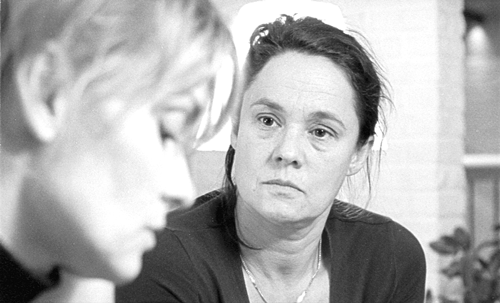Three personal crises in a society questioning its national identity
Tolstoy once informed us that happy families are all alike, and unhappy ones are each unhappy in their own way.
The new Swedish film “Daybreak,” directed by Björn Runge, gives us a fresh spin on this idea as we follow three unhappy storylines that unfold over the same 24-hour period. Continuing the tradition of trawling the darker end of humanity’s pool, in Ingmar Bergman’s vein, Runge mixes the age-old dramas of infidelity, jealousy and paranoia with some contemporary Swedish themes that include xenophobia, social breakdown and the general fear that the nation’s social welfare-oriented society is heading straight down the toilet.
The film focuses on three lives as they are plunged into crisis. Anita (Ann Petrén) is an older woman whom we first meet complaning of chest pains in a hospital, and who later has a noisy encounter with a shrink who wants her to rehash her anger at her husband’s sudden departure three years ago for another woman, the physical therapist who helped him recover from an auto accident. We also meet Richard (Jacob Eklund), a remarkable surgeon who is cheating on his wife, who in turn suspects something—she makes her son take the calls from the mystery woman asking for Richard. The third player in “Daybreak” is Anders (Magnus Krepper), a workaholic bricklayer, whom we meet as he lashes out at a customer who doesn’t have the money to pay him. He destroys all the work he had completed before storming off and going home to the wife and daughter he never gets to see.
“Daybreak” features powerful performances from all of its players. The angriest performance probably belongs to Petrén, whose Anita is at high pitch throughout nearly the entire movie. In a parking garage, she sells her prescription sedatives in exchange for a taser, then heads over to her old house, where ex-husband Olof lives with new wife Petra, and lets loose a torrent of rage on them both. When she’s not screaming, she’s stone-faced with an evil eye.
Eklund plays Richard with a maddening detachment that underscores his utter denial of his wrongdoing. The film opens with him literally holding a human heart in his hands as he performs a transplant. His approach to everything is just as clinical; he refuses to see the hearts and souls of his family or of his mistress Sofie (Marie Richardson), which are also in his hands. When he abruptly announces he’s sold the house (his family’s tenth move in 15 years), his wife Agnes (Pernilla Augst, a Bergman favorite) is astounded, just as she is when he answers the question “Do you love me?” with the reply, “Sometimes.” Richard encounters the unspooling of everyone’s emotions when dinner guests arrive, with surprises of their own, and he offers to cook.
Anders has the strangest encounter, though, with clients who ask him to brick up their windows and front door; he blithely indulges them until they request that he seal them inside. Armed with stockpiles of canned goods that will last for years, and a rifle too, they plan to fend off “invaders”––of their home and their country. Anders, the subject of their abuse when he asks to be paid off the books, learns the couple’s apparent xenophobia in fact masks agoraphobia on an emotional level.
No one is killed in “Daybreak,” but there are certainly some close calls, and the emotional violence is tremendous. Each of the three tales illustrates how ambition eventually collapses under the weight of betrayal and selfishness. Richard, Anita, and Anders all once had high expectations, but now feel betrayed by life.
Yet, Runge offers hope as well––some of his characters prove to have a capacity for learning. Still, the intense emotions in “Daytime,” while very real, are also unrelenting. If you hated it when Mom and Dad fought, “Daybreak” is ten times worse. But, for those who like being a fly on the wall while people are at their very, very worst, “Daybreak” will not disappoint.
gaycitynews.com

































